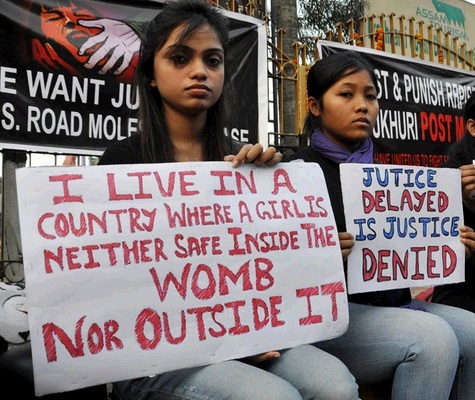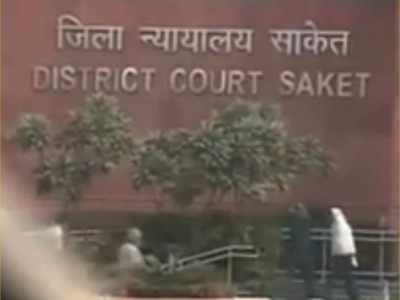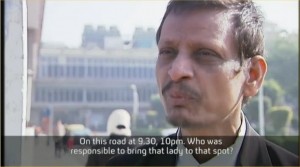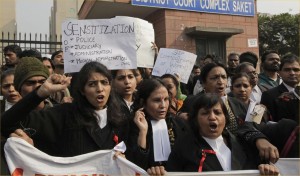Fair Trial of Foul?
Anyone who has been following the news from India will be horrified by the appalling case of the female student who died after being gang-raped by five men on a bus in Delhi. The case has caused outrage both at home and abroad, not least because it does not appear to have been an isolated… Continue reading
Anyone who has been following the news from India will be horrified by the appalling case of the female student who died after being gang-raped by five men on a bus in Delhi. The case has caused outrage both at home and abroad, not least because it does not appear to have been an isolated incident but merely the latest and most egregious of a type of case which the authorities have systematically failed properly or adequately to deal with.
 Given the publicity which the case has received, and the pressure on the authorities to provide an adequate response, it is not surprising that grave misgivings have been expressed over the chances of the five men arrested and charged with her rape being able to get a fair trial.
Given the publicity which the case has received, and the pressure on the authorities to provide an adequate response, it is not surprising that grave misgivings have been expressed over the chances of the five men arrested and charged with her rape being able to get a fair trial.
But there is also the question of fairness to the victims, and in this respect India’s record does not inspire confidence either. If the weight of prejudice is now against the alleged perpetrators, this is a reversal of the more usual situation where the system, both legally and socially, is weighted against the victim.
The Offence of Rape in India
The statistics are horrendous. A rape is said to occur on average every 20 minutes in India. According to a recent report in the Sunday Times,
while 754 people were arrested in relation to 635 rape cases between January and November last year, government data shows that so far only one person has been convicted. Reported rape cases rose by 17% between 2007 and 2011.”
The Supreme Court recently reiterated that convicted rapists should be awarded a minimum term of seven years imprisonment, allowing an appeal by the government of Rajasthan from the decision of the Rajasthan High Court to reduce the sentences of two men convicted of the rape of a woman who had checked into a hotel along with her brother-in-law. One of the two, Vinod Kumar, had his sentence reduced from seven to five years, and the other, Heera Lal, from seven years to just 11 months and 25 days. The High Court was criticised for failing to record any special reasons for the reduction, which the Supreme Court said “reduces the criminal justice delivery system to a mockery” and “defeated the legislative mandate”.
See: State of Rajasthan v Vinod Kumar and another 2012 STPL(Web) 315 SC.
Under section 376(1) of the Indian Penal Code, rape is punishable by a minimum of seven years imprisonment, but a sentence of ten years or even life imprisonment can be imposed. The minimum penalty for gang-rape is ten years: subsection (2).
The Present Case
In the gang rape case, because the victim died, the offences charged include murder as well as kidnap, gang-rape, robbery and destruction of evidence. Because of this, the five men accused, whose ages range from 19 to 35, could face the death penalty if convicted. But a sixth person accused is a minor, thought to be 17, and will be tried separately in a juvenile court, facing a maximum sentence of three years in prison.

The accused or some of them were apparently named in a dying declaration by the victim, taken by an examining magistrate in the hospital in Singapore where she was being treated in a doomed bid to save her life. Her friend, who was also assaulted and injured by the gang before being thrown off the bus and left for dead, and who gave the media a harrowing account of their ordeal, had tried in vain to protect her after they boarded a bus in Delhi whose driver was one of their assailants.
The trial is being conducted in a fast-track process introduced recently to deal with cases of sexual assault. India’s Chief Justice, Altamas Kabir, said “A swift trial should not be at the cost of a fair trial.” Nevertheless, a number of factors cast doubt on this assertion.
Defence Representation
First, and in a move which would be quite alien to the English Bar with its “cab rank principle” and a tradition of defending the indefensible that stretches back to the 18th century pioneering barrister William Garrow, the local bar association in Delhi collectively refused to represent the alleged gang-rapists. Their spokesman, LK Verma, is quoted as saying: “We feel shamed by their behaviour and by their crimes”.
That certainly raises a question about the presumption of innocence.
Then two of their number broke ranks and volunteered to act for the defence. One of them, Manoharlal Sharma, said he enjoys fighting “impossible cases” and the other, Vinod Kumar Anand, said “Everyone has the right to be represented”.
“These people are just seeking revenge,” Sharma said. “They are not seeking justice. A defendant has a right to a lawyer, this is a basic principle of a modern society.”
 So three cheers for a bit of barristerial independence, rather spoiled when Sharma disclosed the nature of his defence case. Accusing the police of obtaining confessions by torture was all very well, but then he went on (in a live TV interview) to say that the real blame should lie with the victims: with the deceased for not behaving in a “respectable” way and with her male friend for failing to protect her (he was beaten unconscious by the gang) and for allowing her to be in the wrong place and the wrong time (in a city centre after visiting a cinema to watch The Life of Pi).
So three cheers for a bit of barristerial independence, rather spoiled when Sharma disclosed the nature of his defence case. Accusing the police of obtaining confessions by torture was all very well, but then he went on (in a live TV interview) to say that the real blame should lie with the victims: with the deceased for not behaving in a “respectable” way and with her male friend for failing to protect her (he was beaten unconscious by the gang) and for allowing her to be in the wrong place and the wrong time (in a city centre after visiting a cinema to watch The Life of Pi).
Whether the jury will accept that the failure of a single woman to be in the right place at the right time somehow excuses a gang of strangers kidnapping, raping, violating her with an iron bar and then dumping her on the street (where she and her friend were ignored by passers by and when the police finally arrived had to wait for treatment until they had finished arguing about which police station had jurisdiction) is another matter. The remark, coming from a defence lawyer, is perhaps only the thick end of a wedge with which we are all too familiar even in our own legal system, ie that whatever a rape complainant may have said by way of refusing consent, you’ve only got to see what she was (or wasn’t) wearing or trawl through her so-called sexual history to find some basis for inferring a willingness to put up with anything from anyone. This is what might be called the “burden of proof of respectability” which lies on the complainant in a rape case where the defence rely on consent.
According to Sharma, he has never heard of a “respected lady” being raped in India. “Even an underworld don would not like to touch a girl with respect.”
So the very fact of rape disproves the respectability which is a necessary ingredient of the offence. Hmm. Sounds a bit like the medieval ducking stool test.
Social Attitudes
 His remarks betray not only the mindset of a rape defence lawyer but what Ranjana Kumari, director for the New Delhi-based Centre for Social Research, describes as the “mindset” of most Indian men. Activists like Kumari say reporting of sex crimes and police investigations of rape are hindered by a tendency to blame the victim for not following the traditional, conservative social roles ascribed to women. Sharma’s remarks tend to bear that out.
His remarks betray not only the mindset of a rape defence lawyer but what Ranjana Kumari, director for the New Delhi-based Centre for Social Research, describes as the “mindset” of most Indian men. Activists like Kumari say reporting of sex crimes and police investigations of rape are hindered by a tendency to blame the victim for not following the traditional, conservative social roles ascribed to women. Sharma’s remarks tend to bear that out.
It is perhaps these attitudes, as much as the particular horrors of this individual case, against which there has been such an outpouring of collective revulsion in India, with protests that may or may not disturb the complacency of the establishment, but certainly seem to have taken the political class by surprise. Unfortunately, the spotlight they focus on the trial itself may do more harm than good.
Sources:
- Lawyers collective (one of the leading public interest service providers in India with a proven record of setting high standards in human rights advocacy, legal aid and litigation): http://www.lawyerscollective.org/
- Bloomberg news coverage: http://www.bloomberg.com/news/2013-01-09/delhi-rape-accused-to-plead-not-guilty-lawyer-says.html
- Indian Express: http://www.indianexpress.com/news/in-din-2-lawyers-break-ranks-one-says-love-fighting–impossible-cases-/1055993
- Judgment of the Supreme Court in the case of State of Rajasthan v Vinod Kumar and another: http://www.stpl-india.in/SCJFiles/2012_STPL(Web)_315_SC.pdf
- Channel 4 news:
- Images from: The Times, Channel 4, Huffington Post.